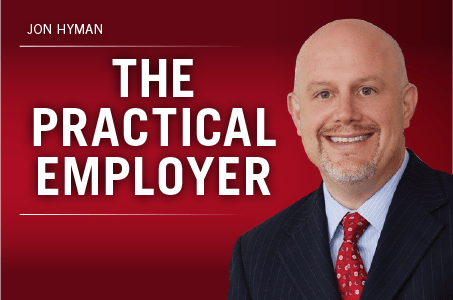OSHA has had a busy October.
First, it announced that it has delayed enforcement, until Dec. 1, of the anti-retaliation provisions of its injury and illness tracking rule.
According to OSHA, “The anti-retaliation provisions were originally scheduled to begin Aug. 10, 2016, but were previously delayed until Nov. 10 to allow time for outreach to the regulated community.” While I hate to be appear cynical, I can’t help but think that the pending lawsuit challenging the legality of these rules has something to do with this delay.
Second, even though OSHA keeps delaying these rules, it continues its efforts to educate employers and employees about them. On Oct. 19, OSHA published both a memorandum and example scenarios interpreting these new anti-retaliation provisions.
So, let’s take a look at the types of scenarios OSHA believes will violate, and will not violate, its ne w anti-retaliation provisions.
w anti-retaliation provisions.
Disciplinary Programs
The rule prohibits disciplining employees simply because they report work-related injuries or illnesses without regard to the circumstances of the injuries or illnesses, such as automatically suspending workers who report an injury or assigning them points that have future employment consequences. The rule also prohibits disciplining an employee who reports a work-related injury or illness under the pretext that the employee violated a work rule if the real reason for the discipline was the injury or illness report.
Illegal Retaliation (according to OSHA):
- Employee is injured when he is stung by a bee at work, and he reports the injury to Employer. Employer disciplines Employee for violating a work rule requiring employees to “maintain situational awareness.” Employer only enforces the rule when employees get hurt.
- Employee twists his ankle at work but does not immediately realize that he is injured because his ankle is not sore or swollen, and therefore he does not report the injury to Employer. The next morning, Employee’s ankle is sore and swollen, and he realizes he has the kind of injury he is required to report to Employer. He reports the injury to the employer that day. Employer disciplines Employee for failing to report his injury “immediately” as required by Employer’s injury reporting rules.
Non-Retaliation (according to OSHA):
- Employee reports a hand injury that she sustained while operating a saw after bypassing the guard on the saw, contrary to the employer’s work rule. Employee’s hand injury required her to miss work for two days. Employer disciplined Employee for bypassing the guard contrary to its instructions. Employer regularly monitors its workforce for safety rule violations and disciplines employees who bypass machine guards regardless of whether they report injuries.
- Employee twists her ankle at work but does not immediately realize that she is injured because her ankle is not painful or swollen, and therefore she does not report the injury to Employer. The next morning, Employee’s ankle is painful and swollen and she realizes it is the kind of injury she is required to report to Employer as soon as practicable. However, Employee does not report the injury after this realization, although she easily could have, and instead reports it several weeks later. Employer disciplines Employee for failing to report her injury as soon as practicable after realizing she has the kind of injury she is required to report.
Incentive Programs
The rule prohibits using incentive programs to penalize workers for reporting work-related injuries or illnesses. If an employee reports an injury or illness, and the employer subsequently denied a benefit as part of an incentive program, this denial may constitute retaliatory action against the employee for exercising his or her right to report an injury or illness.
Illegal Retaliation (according to OSHA):
- Employer informs its employees that it will hold a substantial cash prize drawing for each work group at the end of each month in which no employee in the work group sustains a lost-time injury. Employee reports an injury that she sustained while operating a mechanical power press. Employee did not violate any employer safety rules when she sustained her injury. Employee’s injury requires her to miss work for two days. Employer cancels the cash prize drawing for that month for Employee’s work group because of Employee’s lost-time injury.
- Employer informs its employees that it will hold a substantial cash prize drawing for each work group at the end of each month in which all members of the work group comply with applicable safety rules, such as wearing required fall protection. Employee sustains a lost-time injury when he falls from a platform while not wearing required fall protection. Employer cancels the cash prize drawing for Employee’s work group that month ostensibly because Employee failed to wear required fall protection. However, Employer’s employees routinely fail to wear required fall protection but the only time Employer cancels the cash prize drawing is when an employee reports an injury.
Non-Retaliation (according to OSHA):
- Employer informs its employees that it will hold a substantial cash prize drawing for each work group at the end of each month in which all members of the work group comply with applicable safety rules, such as wearing required fall protection. Employee sustains a lost-time injury when he falls from a platform while not wearing required fall protection, and he reports the injury to Employer. Employer cancels the cash prize drawing for Employee’s work group that month because Employee failed to wear required fall protection. Employer actively monitors its workforce for compliance with applicable work rules and cancels the cash prize drawings when it discovers work rule violations regardless of whether the employee who violated the work rule also reported an injury.
- Employer holds a party for all employees who complete a safety training course. Employee failed to attend the training because she was absent from work due to a work-related injury that she reported. Employer excluded Employee from the training-completion party because she did not complete the training. Employer consistently excluded all employees who failed to complete a training course from the training-completion party regardless of why they failed to complete the training, including those who were on vacation or absent because of a non-work-related injury or illness.
Drug Testing
OSHA plainly states that the rule does not prohibit drug testing of employees, including drug testing pursuant to the Department of Transportation rules or any other federal or state law (such as state workers’ compensation law). It only prohibits using drug testing, or the threat of drug testing, to retaliate against an employee for reporting an injury or illness. Employers may conduct post-incident drug testing if there is a reasonable possibility that employee drug use could have contributed to the reported injury or illness. However, if employee drug-use could not have contributed to the injury or illness, post-incident drug testing could constitute prohibited retaliation, as it would discourage injury reporting without contributing to the employer’s understanding of why the injury occurred .
Illegal Retaliation (according to OSHA):
- Employer required Employee to take a drug test after Employee reported work-related carpal tunnel syndrome. Employer had no reasonable basis for suspecting that drug use could have contributed to her condition, and it had no other reasonable basis for requiring her to take a drug test. Rather, Employer routinely subjects all employees who report work-related injuries to a drug test regardless of the circumstances surrounding the injury. The state workers’ compensation program applicable to Employer did not address drug testing, and no other state or federal law requires Employer to drug test employees who sustain injuries at work.
- Employer requires all employees who report lost-time injuries to take a drug test regardless of whether drug use could have contributed to the injury because the drug testing requirement is included in the collective bargaining agreement at the workplace. Employer drug tests Employee (who is covered by the collective bargaining agreement) when she reports a lost-time injury that could not reasonably have been caused by drug use, such as a bee sting or carpal tunnel syndrome. The employer had no reasonable basis for suspecting that drug use could have contributed to her injury and had no other reasonable basis for requiring the test.
Non-Retaliation (according to OSHA):
- Employee was injured when he inadvertently drove a forklift into a piece of stationary equipment, and he reported the injury to Employer. Employer required Employee to take a drug test.
- Employer drug tests all employees who report work-related injuries to the employer to get a 5% reduction in its workers’ compensation premiums under the state’s voluntary Drug-Free Workplace program. Employer drug tests Employee when she reports a work-related injury that could not reasonably have been caused by drug use, such as a bee sting or carpal tunnel syndrome.
- Employer requires all employees who report lost-time injuries to take a drug test because the employer’s private insurance carrier provides discounted rates to employers that implement such a drug-testing policy. The relevant rate discount provisions in the private policy are identical to those in the applicable state workers’ compensation law. Employer drug tests Employee when she reports a lost-time injury that could not reasonably have been caused by drug use, such as a bee sting or carpal tunnel syndrome.
If OSHA’s new anti-retaliation rules go live, employer will have to study these examples as if they are gospel, as they will help employers navigate the increasingly complex world of OSHA compliance so as to avoid costly and complex retaliation complaints.
Jon Hyman’s post originally appeared on Meyers Roman’s Ohio OSHA Law Blog.
Jon Hyman is a partner at Meyers, Roman, Friedberg & Lewis in Cleveland. Comment below or email editors@workforce.com. Follow Hyman’s blog at Workforce.com/PracticalEmployer.




